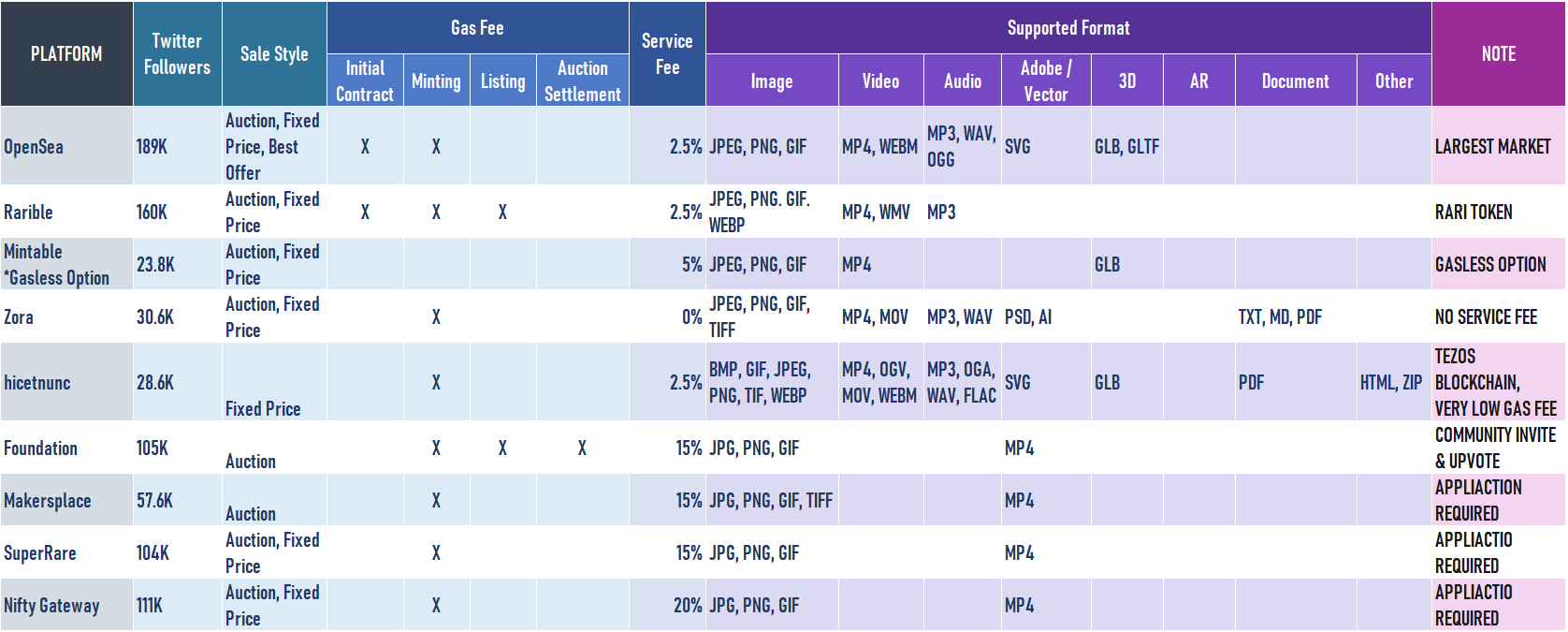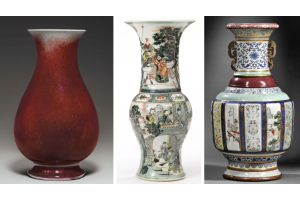A Guide To The World Of NFT Platforms
-
April 29, 2023
Informational

Written by: Steven Shannon
In recent years, NFTs have made headlines as a new, secure method to create, sell, and own unique digital assets. In 2021 alone, the NFT market for digital assets grew to almost US$41 billion, competing with the market for physical assets. These digital assets can range from digital art to virtual monsters in games, so it is no wonder that many collectors are deciding to invest and purchase their own NFTs. But with all these types of assets, more and more marketplaces are being developed. Some cater to specific assets, while some are general purpose. As more marketplaces emerge, how do you choose the best marketplace to collect and sell assets? This guide delves into the best NFT marketplaces available today, providing you with the knowledge to navigate this exciting landscape and a few key criteria to consider when choosing a marketplace.
What are NFTs?
NFTs, or non-fungible tokens, are unique digital assets verified using blockchain technology. Unlike cryptocurrencies such as Bitcoin or Ethereum, NFTs are indivisible and unique, making them ideal for representing ownership of digital art, music, videos, and other digital collectibles.
Key Criteria for Choosing an NFT Marketplace
Here are a few key criteria to consider when choosing a marketplace:
1. Type of Marketplace
First, we have to look at the type of marketplace because the features and accepted type of digital assets differ from marketplace to marketplace. Generally, marketplaces can be categorized as either streamlined or augmented. Streamlined marketplaces, such as OpenSea, target a broader audience, supporting more NFTs and offering limited, generic services. However, augmented marketplaces, like NBA Top Shot, target a niche audience, specializing in one type of NFT and offering more personalized services.
There are pros and cons to both types. Streamlined marketplaces have a wider range of NFTs and have a large, varied user base. As these marketplaces are focused on efficient transactions, they accept payments in both cryptocurrency and credit cards. However, they do not have many additional services. On the other hand, augmented marketplaces support one type of NFTs while offering many specialized features such as minting, marketing, and portfolio tracking. These advanced services do come at a cost of higher fees.

Source: Platform Professional
Deciding the type of marketplace requires you to look at your assets and target audience. If the type of NFT is the same throughout all the assets and the target audience is niche, then working with an augmented marketplace would be beneficial. Their advanced features and niche experience ensures a successful launch, both paying off the investment fees at the start and driving additional value. On the other hand, if you are looking to appeal to a broader audience, then a streamlined marketplace would work best.
2. Reputation
Now that you’ve narrowed down your choices, we can move on to the reputation of the marketplaces. The reputation of a marketplace is an important detail to consider because it describes past user experiences. Marketplaces with good reputations within the NFT community are accepted to be trustworthy and reliable.
There are many ways you can gauge the reputation of the marketplace. One is by surveying information posted online written by past users. Start by reading online forums and community posts to decide whether the marketplace is trustworthy and reliable. Other methods of finding reviews include reading platform analytics and user reviews, which are both publicly available.
Another method to gauge reputation is by looking for any scandals the marketplace has. Even the most positively reviewed marketplaces may have a scandal. Even OpenSea, the largest NFT marketplace, has a few scandals.
But on the flip side, look out for upcoming trends for even new marketplaces. For example, upstart marketplace Blur has been known for overtaking OpenSea. This new NFT marketplace that was only recently released generated $460 million in NFT trades over the course of 7 days, whereas OpenSea only saw a trading volume of $107 million.
3. Security
While blockchain networks are known to be secure, the security of the marketplace websites is another story. For example, even though OpenSea uses the reputable blockchain Ethereum, the website had a security flaw where hackers were stealing user’s crypto wallets. Though the security flaw was promptly fixed, the security issue could have dangerously impacted many people.
That is why security is another main concern when choosing a marketplace. Features like the following are what makes a secure website: two-factor authentication, identity verification, advanced encryption, and insurance for transactions.
4. Fees
The final criterion is the fees charged by the marketplace for buying and selling NFTs. Typically, there is a fee on every transaction because of the amount of work blockchain miners do to include the transaction into the blockchain block. Aside from the gas fee, each marketplace has their own set of fees, and it varies from platform to platform. For example, OpenSea charges a 2.5% transaction fee to the seller, and Rarible charges 2.5% for both buyer and seller. Not only that, many other platforms charge 15% for first-time sales. You must also consider the type of the marketplace when looking at fees because augmented marketplaces have higher overall fees than streamlined marketplaces.
There are many fees in a marketplace to consider. After the gas price, there are fees on transactions such as primary sales, secondary sales, and all sales. Primary sales, or mint sales, are fees when the artwork has been sold for the first time. Secondary sales is a tax on the artwork on any other transaction other than the first. Aside from those three, augmented marketplaces have many other maintenance fees for their many specialized features.

Source: NFTX - NFT Art Exhibition
Best NFT Marketplaces
OpenSea
OpenSea is the largest and most popular NFT marketplace, offering a wide range of digital assets, including art, music, domain names, and virtual worlds. It supports Ethereum and Polygon blockchains, providing users with a versatile platform for their NFT needs.
Rarible
Rarible is a community-owned NFT marketplace that allows users to create, buy, and sell NFTs. It offers a decentralized approach, giving users more control over their digital assets. Rarible supports Ethereum and Flow blockchains.
SuperRare
SuperRare is an exclusive NFT marketplace focusing on high-quality digital art. Each artwork is unique and created by renowned artists. SuperRare operates on the Ethereum blockchain and is known for its strict curation process, ensuring only the best digital art is available.
Foundation
Foundation is a creative platform that connects digital artists with collectors. It offers a simple and intuitive interface, making it easy for artists to mint NFTs and for collectors to browse and purchase unique digital art. Foundation also operates on the Ethereum blockchain.
Mintable
Mintable is an easy-to-use NFT marketplace that allows anyone to create, buy, and sell NFTs without needing any technical knowledge. It supports both Ethereum and Zilliqa blockchains, providing flexibility for users.
NFT Investment Tips
Investing in NFTs can be lucrative, but it’s essential to approach it with caution. Here are some tips for investing in NFTs:
- Research: Understand the artist, the artwork, and the platform before making a purchase.
- Community Engagement: Participate in NFT communities to stay updated on trends and opportunities.
- Diversification: Don’t put all your investments into one type of NFT. Diversify across different categories and platforms.
- Long-Term Perspective: NFTs can be volatile. Consider long-term potential rather than short-term gains.
Conclusion
NFTs offer a new and exciting way to engage with digital art and collectibles. By understanding the best NFT platforms and following investment tips, you can navigate the NFT market with confidence. Through this guide, you should be able to decide on the best NFT marketplace given a set of scenarios. Whether you’re an artist looking to showcase your work or a collector searching for unique digital assets, there’s an NFT marketplace you can use to narrow down your choices.
References:
- https://medium.datadriveninvestor.com/nfts-in-2023-how-will-their-future-be-e8ca612dd854
- https://hbr.org/2021/11/making-sense-of-the-nft-marketplace
- https://pixelplex.io/blog/top-nft-marketplaces/
- https://thinkml.ai/how-to-choose-the-best-nft-marketplace/
- https://www.cryptotimes.io/how-to-choose-the-right-nft-marketplace/
- https://www.cnbc.com/2022/06/01/former-opensea-employee-charged-in-first-ever-nft-insider-trading-case.html
- https://www.engadget.com/open-sea-vulnerability-exposed-crypto-wallets-to-attack-security-researchers-say-100028216.html
- https://nftclub.com/why-are-opensea-fees-so-high/
- https://help.superrare.com/en/articles/5662523-what-is-the-fee-structure-on-superrare


 PREVIOUS ARTICLE
PREVIOUS ARTICLE 








